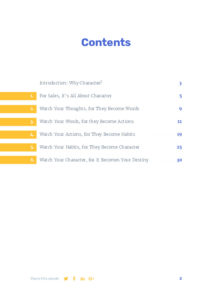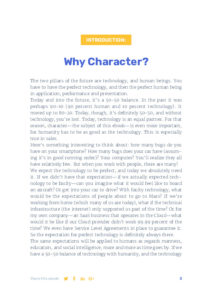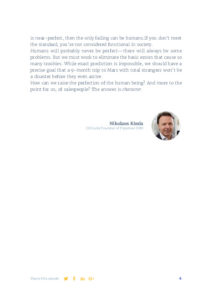In this ebook, Nikolaus Kimla discusses the two pillars of the future are technology, and human beings and how you have to have the perfect technology, and then the perfect human being in application, performance, and presentation. He argues that today and into the future, it’s a 50-50 balance. In the past, it was perhaps 90-10 (90 percent human and 10 percent technology). It moved up to 80-20. Today, though, it’s definitely 50-50, and without technology, you’re lost. Today, technology is an equal partner. For that reason, character—the subject of his ebook—is even more important, for humanity has to be as good as the technology. This is especially true in sales.
Here’s something interesting to think about: how many bugs do you have on your smartphone? How many bugs does your car have (assuming it’s in good running order)? Your computer? You’ll realize they all have relatively few. But when you work with people, there are many! We expect the technology to be perfect, and today we absolutely need it. If we didn’t have that expectation—if we actually expected technology to be faulty—can you imagine what it would feel like to board an aircraft? Or get into your car to drive? With faulty technology, what would be the expectations of people about to go to Mars? If we’re working from home (which many of us are today), what if the technical infrastructure (the internet) only supported us part of the time? Or for Nikolaus’s own company—an SaaS business that operates in the Cloud—what would it be like if our Cloud provider didn’t work 99.99 percent of the time? We even have Service Level Agreements in place to guarantee it. So the expectation for perfect technology is definitely always there.
The same expectations will be applied to humans as regards manners, education, and social intelligence, more and more as time goes by. If we have a 50-50 balance of technology with humanity, and the technology is near-perfect, then the only failing can be humans. If you don’t meet the standard, you’re not considered functional in society. Humans will probably never be perfect—there will always be some problems. But we must work to eliminate the basic errors that cause so many troubles. While exact prediction is impossible, we should have a precise goal that a 9-month trip to Mars with total strangers won’t be a disaster before they even arrive.
How can we raise the perfection of the human being? And more to the point for us, of salespeople? The answer, Nikolaus offers, is character.


































Comments (7)
Character is critical for long term success – character requires self-awareness, reflection and a commitment to continuous improvement – great ebook!
The ebook does a great job in unpacking the elements of building character. There are a lot of factors that come into play when developing character such as responding appropriately to others and how developing these traits over time relates to sales. I agree that we should show empathy and respect when communicating to buyers and customers during the sales process.
Interesting article- especially noting that technology and humans should be equal partners. Character and technology must compliment each other in order for success.
The ebook does a great job at breaking down what the most important aspects of selling is. Character. I like the author used analogy of technology as being perfect in form, but reminds us that the driving force behind using that technology efficiently for sales is character. The Network Sales Model is direct and comprehensively clear on the main tenets of applying character to a sales situation.
Great read- Seeing that technology and humans are not enemies but partners to expand their intelligence together. We help each other and with each other we can expand more and have more success together.
The idea that humans having “bugs” is what makes them imperfect when compared to many other things is what I believe gives us as people character. Which then in turn allows us to work on our “bugs” to become more effecient and more effective.
The book brings out the need for application of the “golden rule” in sales and business relationship management. It goes further to train on emotional intelligence during sales process on how to handle prospects and clients in a real world without faking things up. Great book